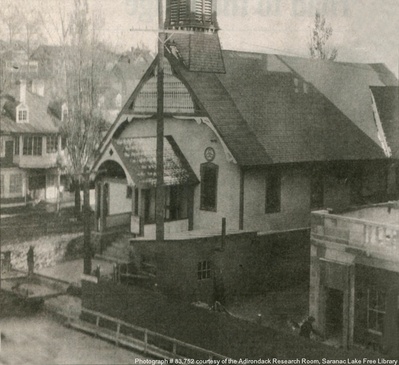 The future Odd Fellows Hall. The Hotel Saranac is under construction, at right. (1926) Adirondack Daily Enterprise, October 25, 2003
The future Odd Fellows Hall. The Hotel Saranac is under construction, at right. (1926) Adirondack Daily Enterprise, October 25, 2003 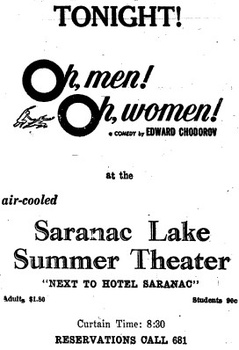 Summer Theater at the Odd Fellows ad Adirondack Daily Enterprise, August 20, 1957
Summer Theater at the Odd Fellows ad Adirondack Daily Enterprise, August 20, 1957 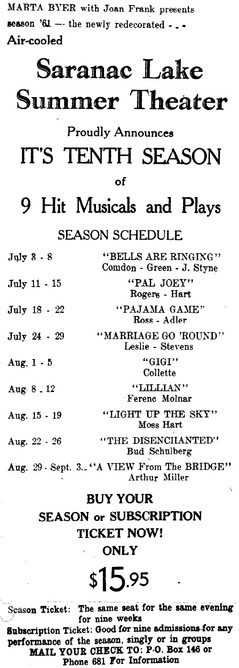 Adirondack Daily Enterprise, June 20, 1961 Located just east of the Hotel Saranac on what is now a parking garage for the hotel; it is shown as 99 Main Street on the 1924 and 1945 Sanborn Maps, that show the Hotel Saranac at 95 Main Street (now 100 Main). The building was built as First United Methodist Church; when they built their new church in 1925 on Church Street, their first church building was sold to the local chapter of the Independent Order of Odd Fellows (IOOF) for $35,000.
Adirondack Daily Enterprise, June 20, 1961 Located just east of the Hotel Saranac on what is now a parking garage for the hotel; it is shown as 99 Main Street on the 1924 and 1945 Sanborn Maps, that show the Hotel Saranac at 95 Main Street (now 100 Main). The building was built as First United Methodist Church; when they built their new church in 1925 on Church Street, their first church building was sold to the local chapter of the Independent Order of Odd Fellows (IOOF) for $35,000.
Later, the Odd Fellows moved to the Masonic Temple. In 1961, the building was bought by Joan Frank and used as a summer theater until 1963, when she moved her troupe to Lake Placid. The building had seen earlier theatrical use, dating to June, 1952). 1.
The Odd Fellows are listed at 70 Broadway, the Masonic Temple, in several advertisements from the 1970s.
Malone Palladium, January 18, 1894
Saranac Lake-Lodge, No. 659, I.O.O.F., has elected the following officers for the ensuing term:—
N. G. — W. A. Denison. V. G — Henry Shelly. Secretary — Fred P. Calkins. Treasurer — George S. Grice. W. — J. H. Farrington, Jr. C. — R. W. Hughes. O. G. — Frank Hatch. X. G. — A. Fortune. R. S. N. G. — Jos. Merkel. L. S. V. G. — Hiram Benham. R. S. V. G. — K. W. Blumenthal. L. S. V. G. — A. W. Martin. R. S. S. — J. N. Smith. L. S. S. — Fred Colbath.
Lake Placid News, May 2, 1924
ODD FELLOWS STAGE ANNUAL FUN REVUE
Play to Capacity Houses at Both Performances
Declared to be one of the finest program of its kind ever presented in Saranac Lake, the Odd Fellows minstrel show, staged by the local lodge, played to capacity audiences at both performances of it fourth annual fun revue given in the town hall last Wednesday and Thursday. Victor Jordan, Winchester MacDowell, Rov Lobdell and Jack Walker as end men captivated the audience with their sparkling humor, against a foil of Percy E. Miller as interlocutor.
Mr. MacDowell, with his clever presentation of the well known song, "It Ain't Goin' to Rain No Mo'," in which numerous verses were travesties on local subjects and characters, scored one of the hits of the evening, and the enthusiastic audience called for repeated encores. He also featured with his chalk talk in the second part of the program, this unique form or entertainment being well received.
Sharing the honors with Mr. MacDowell was Jack Walker, whose comic song, "Your Mamma's Gonna Slow You Down", also made several repeat verses necessary. "Mindin' My Busi-, ness", sung by Roy Lobdell, which also brought local characters in the limelight, was considered one of the hits of the performance, and waves of merriment swept over the audience at each satire.
Matthew Jones, presenting "At the Bottom of the Deep Blue Sea"
was also very well received, as were tenor solos by Hugo R. Franz, Delbert Oldfield, Joseph Weldon and Peter W. Moe.
Nicholas Acrivlelis, with his musical saw and pitchfork, which has proved a favorite with local audiences, introduced a new novelty in the form of musical glasses on which he performed with considerable skill. Encores for this act brought a number of violin solos which were rendered in masterful style.
Delbert Oldfield and Victor Jordan, in a comedy skit "Me and You", featured some amazing mathematical gymnastics. Roy Lobdell and Jack Walker also presented a number of clever songs in an act billed as "'Friends" the two acts combining to form the "Blackbird Quartette" in the closing number of the program.
Adirondack Daily Enterprise, November 15, 1926
Odd Fellows Dance
Plans are being made by the local Odd Fellows lodge, to hold a public dance at the town hall in Bloomingdale on Thursday evening. A program of new and old time square dances is being arranged, similar to the two successful dance given previously this fall by the lodge. Frank Fortune, Alfred Moody, Esmond Winch and P. W. Moe are in charge of the preparations.
Letter to the Editor, Adirondack Daily Enterprise, June 12, 2014
Saranac Lake theatre thrived in '50s and '60s
. . . in the late '50s and early '60s, Saranac Lake enjoyed its very own in-town professional summer stock theatre. First owned and operated by Broadway producer Dorothy Olim, the company boasted professional actors, staff and crew hired from New York City. These presented years of first-rate seasonal theatre in the old Odd Fellows Temple next to the Hotel Saranac.
In 1960 the theatre was sold to Joan Frank. She refurbished the building and the theatre's program, transforming and expanding our Summer Theatre with an ambitious program that weekly alternated legit plays with alternate musicals -- many fresh from Broadway stages and newly licensed.
During my childhood years in town, I participated in local community theatre productions, but I was actually living in New York City when I auditioned and won the role of Helen Keller in the Joan Frank's stock production of "The Miracle Worker." Hired out of the city, I then returned to live and work summers in Saranac Lake with Joan's theatre.
In Saranac Lake the line between professional theatre and community theatre seemed often blurred. Local professional residents often worked in community theatre, and members of the community were sometimes drafted to fill in as needed at the Summer Theatre . Our Joan Frank went on to found the Lake Placid Playhouse and North Country Center for the Arts, but later returned to Saranac Lake, creating community theatre productions of Broadway shows with local children performing all the roles, inspiring new generations with the magic of theatre.
Bibbe Hansen
Hudson
Lake Placid News, July 6, 1956
SUMMER THEATER FIFTH YEAR
Stock Group at Saranac Lake to spend a few months In reality Produce ‘In the Round.'
By Edith Gelles
The Saranac Lake Summer Theater is celebrating its fifth anniversary this season. In 1951 Mr. and Mrs. Kendric Packer organized the stock group and ever since they have been delighting audiences at the Odd Fellows Temple with a variety of classical and hit plays.
The company originally came from Yale Drama School but this year, though the majority of the 17 actors still come from Yale, a number of other universities are represented as well as professional actors. "Everybody does everything around here," said Mrs. Packer in an interview. "We are non-equity. resident company." That is, the actors are non-union members, and they therefore are free to work on props, at directing and at make-up. Union members are only allowed to act.
This year there are five directors with the company. One week someone may play a lead and the next week direct the production. It is much like the off-Broadway groups in New York City.
The organization has six stock-holders. Mr. Packer, who for the past four years has been managing director, is not here this season, but he did do the preliminary work and planning in New York last spring. Mrs. Libby Packer and Dolly Davis, a member of the company for its first two seasons, have assumed the burden of managing the summer activities.
The productions are done "in the round." The audience surrounds the players rather than sitting before them in the conventional proscenium (stage) style. This arena effect makes it much more difficult for the actors: they have to get away from the feeling of having their backs to the audience. The director, instead, aims to move each individual around and there is much room for him use his imagination.
The Saranac Lake Summer Theater is a resident company in contrast to the "star-package" company. They therefore, do not work with any big-name actors and actresses who travel from place to place bringing with them four or five of their main characters. The Saranac Lake group prefers working in a small company where each person has the opportunity to play a choice part at some time.
Summer stock sounds like a 'Most delightful and romantic way spend a few months. In reality it is a most tedious strain on the mind and body. Rehearsals begin two weeks before opening night. For the first week every morning is spent rehearsing the first production on the summer program. During the second week that play is pushed up to the afternoons and the next play is rehearsed in the mornings. By the third week, the third play is done in the mornings, the second during the afternoons and a performance is given every evening. In this way the actors are doing three shows a day and are always rehearsing two weeks ahead of their schedule. They have Tuesday mornings off and must use this, their only free time, to learn lines. Says Mrs. Packer. "We feel like we're on a merry-go-round until mid-September: when we start, we know its going to be hard, but we can't help ourselves."
In choosing the plays, consideration must be given to a number of things. The managers, with suggestions from the directors, must think firstly of what can be done in the round: the setting of a play is most important. They must also consider the number of people used in the cast in order to reserve enough for the back-stage work."
Mr. and Mrs. Packer are professionals. They met at Yale where Mr. Packer was a play-wright major and Mrs. Packer an acting major. They organized the summer theater the first summer they were married and their oldest son was born that year in Lake Placid. They now have another son, and both boys are in Saranac Lake this summer living with the company at a large atmospheric house on Franklin Avenue.
During the winter Mr. Packer writes and manages movie houses as he is this summer to Philadelphia. Mrs. Packer makes rounds and has been doing work in television. The first play of the 1956 season is Garson Kanin's "Born Yesterday." Billie Dawn, the dumb ex-chorus girl, is being played by Margaret Bruse, who has been with the company for the past three seasons. This gifted young comedienne, a student at Syracuse University, will be remembered for her parts last year as the maid in "The Fatal Weakness" and the opera-singing mama in “Gigi.”
Richard Valentine, the hero, goes to Yale Drama School and originally studied law. He has played with a number of stock companies and studied at Leland Bowers School of the Theater in Boston.
Harry Brock, the big-time operator, is being played by Edward Swain who is a member of the Cleveland Playhouse Co. Mr. Swain has been playing in summer and winter stock since 1944 except for the two years when he served in the Navy. In the Navy he organized the Amphib Little Theater at the U.S.N. Amphibious Base, Little Creek, Va.
Adirondack Daily Enterprise, June 17, 1957
S.L. Summer Theatre:
Cast Arrives And Work Starts
The first rehearsal of “Bus Stop,” William Inge's Broadway hit, was held today at the Saranac Lake Summer Theater.
This morning's rehearsal and opening was preceded by the arrival of ten actors, directors and technicians during the weekend, headed by Richard T. Edelman and Ida Redding, the artistic and technical directors, respectively.
Work at the theater in the round, which opens its sixth season at the Odd Fellows Temple on Main Street, entered its final stage after two weeks of intensive preparation by producers Sheldon Baron and Dorothy Olim, assisted by Chris Soule, the stage manager.
On Sunday Sol Drutz was on hand at the bus depot to welcome Elinor Fuchs and Robert Zangwill to Saranac Lake. Mr. Drutz has been associated with the theater frequently, both as an associate producer and actor. Of this year's group, the co-producer of Noel Coward's “Private Lives” last year remarked, “The company is an extremely varied and handsome group of young people.”
[remainder illegible]
Adirondack Daily Enterprise, June 15, 1961
"How Light the Load"
Unscheduled Comedy Saranac Lake's Summer Theater is truly a community project as was proved yesterday when several able bodied men were recruited by Marta Byer and Joan Frank to unload the chairs for the theatre's opening performance on July 3.
Another fine effort was recorded in the theatre's behalf when tile Saranac Lake Fire Department places the advertising banner across Main Street. Miss Byer likes all this attention and the fact that the police channeled traffic during the sign raising made her doubly ecstatic about the cooperative community.
Adirondack Daily Enterprise, July 8, 1976
Joan Frank, Tri-Lakes Pied Piper of the arts
By HELEN EDELMAN WARD
LAKE PLACID — "Before the first time I came up to Saranac Lake in 1961 I thought the earth was flat," Joan Frank, managing director of the Lake Placid Center for Music, Drama and Art, said.
But she did not fall off the earth, which she found to be bordered by the Adirondack's and as explorers before her, she established an empire — in this case a cultural oasis.
A native of Amityville, Long Island, Ms. Frank first performed in the North Country in 1960 in summer stock in Schroon Lake. She worked as a singer, actress, comedienne and nightclub performer before taking the reigns offstage as a producer.
Surprise Responsibilities
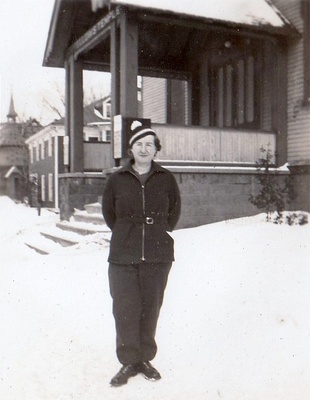 TB Nurse Alberta Kenny Bodah with Odd Fellows Hall and St. Luke's Church visible at left, late 1930s/early 1940s. Photo property of Dan Bodah. The first theatrical enterprise Ms. Frank undertook was the Saranac Lake summer theater next to the Hotel Saranac which she bought in 1961 with Marta Byer and Kenny Prohaska. Prohaska, a building contractor who has since died, was the silent partner; Marta Byer was supposed to be the business manager; and Joan Frank was supposed to act and produce the shows.
TB Nurse Alberta Kenny Bodah with Odd Fellows Hall and St. Luke's Church visible at left, late 1930s/early 1940s. Photo property of Dan Bodah. The first theatrical enterprise Ms. Frank undertook was the Saranac Lake summer theater next to the Hotel Saranac which she bought in 1961 with Marta Byer and Kenny Prohaska. Prohaska, a building contractor who has since died, was the silent partner; Marta Byer was supposed to be the business manager; and Joan Frank was supposed to act and produce the shows.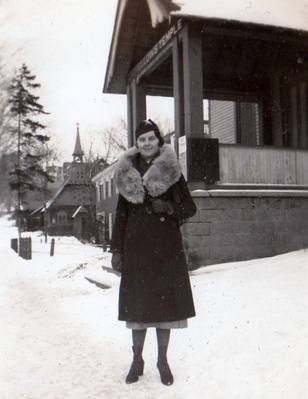 Unknown woman outside Odd Fellows Hall, late 1930s/early 1940s. Photo property of Dan Bodah.
Unknown woman outside Odd Fellows Hall, late 1930s/early 1940s. Photo property of Dan Bodah.
While Prohaska kept up his end of the financial arrangement it became obvious, and she admitted, that Ms. Byer had no expertise whatsoever for business details and the entire burden of running the theater fell on the shoulders of Joan Frank. After a weekend crash-course in management from the former owner of the theater, Ms. Frank took over the business end of the partnership and ran everything for three years virtually by herself.
Besides being unable to cope with the business, Ms. Byer apparently had a problem in recognizing talent. One night Ms. Frank was approached by a young waitress in a restaurant in Saranac Lake who asked for "any kind of work — even a walk-on part in a play." While Joan Frank was willing to give the young woman a chance Ms. Byer said she would "not have a waitress on stage."
"That's how we missed discovering Faye Dunaway," Ms. Frank said.
Prohaska's health and Ms. Frank's and Ms. Byer's relationship deteriorated and the partnership finally dissolved in 1963. The Saranac Lake theater closed and Joan Frank and Kenny Prohaska moved their base of operation to Lake Placid to a building now called the Signal Hill Theater, at that time used only for Tuesday night chamber music concerts produced by Mrs. W. Alton Jones, the landlady.
The building had only one electric socket but Ms. Frank started renovations with only $80 in her pocket and optimistic enthusiasm. [The remainder of the article is illegible.]
Source
- Adirondack Daily Enterprise, October 25, 2003
Comments
Footnotes
1. Adirondack Daily Enterprise, January 6, 1996



